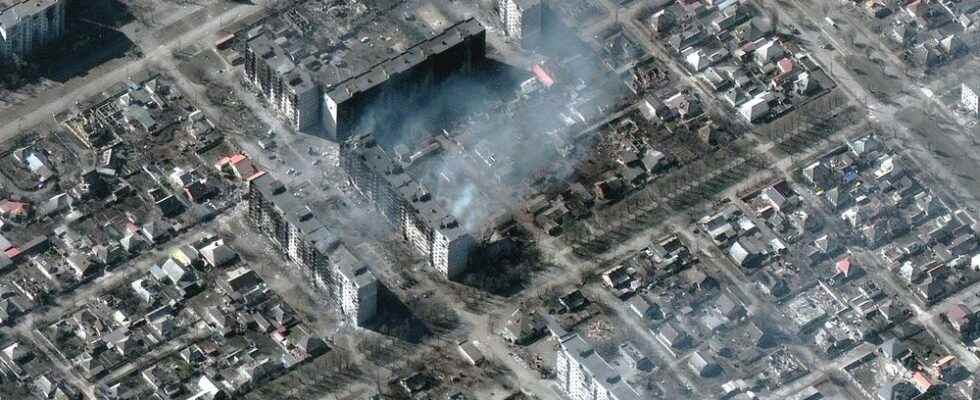Can the escalation of violence push Westerners to intervene militarily in Ukraine? The question took on particular urgency following the NATO and G7 summits in Brussels on Thursday 24 March. “If Russia uses chemical weapons, NATO will respond,” warned Joe Biden, adding without further details that “the nature of the response will depend on the nature of the use”. In the event of an attack of this nature, Moscow would pay “a very high price”, added, this Friday, the American national security adviser Jake Sullivan.
The American president described as a “credible threat”, the use by Moscow of these weapons prohibited by international law. In question, the repeated accusations of Russia in recent weeks around an alleged “chemical and biological weapons program” American in Ukraine. “The elements of Russian language are generally harbingers of their next initiatives. Concretely, it is a question of blaming the opposing party for what they are about to do”, points out Martin Quencez, deputy director of the Paris office of the German Marshall Fund of the United States. “Also, when they accuse Ukraine of possessing chemical weapons, this may prefigure their use by Russia.”
No “red lines” drawn
Many observers also fear that the head of the Kremlin will indulge in a headlong rush into violence, frustrated by the failure of his blitzkrieg and the fierce resistance of the Ukrainian army. What already tends to prove the massive shelling of certain cities like Mariupol, destroyed to more than 80% by the Russian bombardments.
“The Russians could be tempted to harden their offensive even further by resorting to chemical weapons, in particular to take cities that would be too difficult to seize, confirms General Dominique Trinquand, military expert and former head of the French mission to the “UN. Tactically that would be an advantage, but it would also cause a psychological shock to the West.”
Satellite image taken by US company Maxar shows destroyed or burning residential buildings in Mariupol, southern Ukraine, March 22, 2022.
afp.com/-
Their use against rebels in Syria by the regime of Bashar al-Assad, an ally of Moscow, was presented as a “red line” by US President Barack Obama in 2013, who threatened Damascus with air strikes if this limit was crossed. . But the American president did not take action when this crime was committed.
For the time being, Westerners have been careful not to draw any new “red line”, likely to lead to an intervention. Conversely, Emmanuel Macron estimated Thursday that “strategic ambiguity and discretion are more effective”. The French president, however, recalled that the NATO countries did not want to “become co-belligerent” in the conflict. At this stage, the Alliance’s Secretary General, Jens Stoltenberg, simply announced the supply of “equipment to help Ukraine protect itself against chemical, biological, radiological and nuclear threats”.
Public pressure
The use of chemical weapons by Russia would in any case have an undeniable effect on Western public opinion. “Voices calling for military intervention to end the slaughter can be expected to grow louder if necessary,” said Samantha de Bendern, Eurasia researcher at Chatham House, a think tank. Londoner.
“There would be no automatic military response because that would imply a direct confrontation with Russia, which Western countries have always refused until now, adds General Trinquand. But this position may change if massive Ukrainian losses linked to the use of chemical weapons are causing a stir in Western populations.”
French Rafale fighter jets on patrol over Poland as part of a NATO airspace surveillance mission, March 4, 2022.
afp.com/Nicolas TUCAT
In early March, Republican Representative from Wyoming, Liz Cheney, said Russia’s use of chemical weapons should be seen as a “red line”. “We have to be very clear that we are considering all options, that the use of chemical weapons is certainly something that would change our calculations,” the daughter of former Vice President Dick Cheney told NBC. considered a “hawk”.
Similarly, Polish President Andrzej Duda said in an interview given to the BBC on March 13, that the use of this type of armament would “change the deal” with regard to NATO’s position. Three days earlier, Britain’s undersecretary of defense had warned that “President Putin should reflect on the fact that when other countries have used chemical weapons, they have provoked an international reaction”.
“The use of chemical weapons would mark a break in this war for the allies: there would be a before and an after, judges researcher Martin Quencez. And there is a whole spectrum of possible responses: more arms deliveries, an increase in economic sanctions, even targeted strikes against Russian forces.” But, recognizes this expert, it is not possible for the moment to determine the option which would be chosen.
